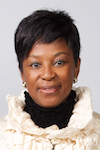
What is your political background? How did you come to join your political party and become an MP? My political awareness started in 1988 as a student activist at the University of Limpopo (Turfloop) as that campus was a hive of political activity. From 1992 having moved to study at the University of Durban (Westville), I became a student leader. Post university I joined the ANC Women’s League (ANCWL) at a very young age in early 1996. In 1999 the ANC deployed me to the Free State Provincial Legislature where I was a member of the finance portfolio and chaired the multi-party women’s caucus committee as well.
From there on I was deployed as a Member of the Mayoral Committee (MMC) for about a year during my councillorship. In 2003 I was then deployed to the National Council of Provinces (NCOP) in the social cluster committees until 2004. In 2004 I was deployed to the National Assembly (NA) as a whip for the ANC in the Trade and Industry portfolio committee. In the period from 2004-2009 I also served in the Transport, Social Development, Arts and Culture committees and was Chairperson of the Parliamentary Interfaith Council.
From 2014 to date I have been deployed in the Standing Committee on Public Accounts (SCOPA) and am whip to the multi-party women’s caucus. I also chair the Association of Public Accounts Committees in South Africa as well as the Standing Committee on the Auditor-General (SCOAG).
What does your job as an MP entail? On Monday I am at my constituency and we generally deal with labour and social welfare issues mostly as my constituency is peri-urban.
On most Tuesday to Thursdays I attend the SCOPA portfolio but on Thursday from 13:00, I attend the multiparty women’s caucus once a month so that on Friday we deal with the SCOAG portfolio.
What are you finding most challenging about the Fifth Parliament? What obstacles prevent Parliament from doing its work and how would you fix it? The only challenge I have observed is that we develop good policies without implementing them and developing afresh new policy papers without having tested previous policy; and this dates back to the Third Parliament. Regarding the Fifth Parliament specifically, people have come to follow the law making process more attentively however; there is an element where our citizens think we play here because of the shenanigans that occur at the Chamber. I would prefer that more television and radio coverage would focus on committee work.
Secondly if we were to implement a lot of the resolutions that we take in the House when the Chamber is in session, Parliament would function better and would be relevant to our citizens. Moreover as committees we have to take the Money Bills more seriously and demand the space since budget allocations start at committees.
Does Parliament do a good job of holding the Executive to account? If not, what can be done to improve this? I am satisfied with our progress because SCOPA allows me to oversee the entire government expenditure and to rectify and intervene when it is necessary to do so. Joint committee sittings would enable us to be more effective as the stance by SCOPA is to see more consequence management for State malfeasance and it is bearing fruit however slow that it may sometimes look.
Are you happy with the proportional representation system or are you in favour of electoral reform? The system is effective as it is currently.
Is Parliament’s public participation model adequate/robust enough that it affords enough public participation before a law is passed? We certainly can improve the opportunities we give the public to give input on proposed laws and policies but that would have to happen in tandem with extension of the periods allocated to committees to consult stakeholders; because that remains our biggest challenge in both Houses of Parliament. Of course we could also take Parliament to the people more as we derive mandates from them; as the trend during public hearings is that voices of lobby groups are the loudest as they have the means to come to Parliament.
What are you passionate about? This applies both in a political/professional arena as well as personally? Being a public representative is the most appropriate job I could have been given because I love being a servant to the communities I represent. That remains my biggest passion because you sleep better knowing that you would have assisted someone to also sleep better’ whatever the situation that had brought them to you may have been.
What is your message to South Africa? South Africans should participate in politics because that is one way how to follow how their tax deductions get spent by government. Participation in politics in between general elections better empowers voters for the next general election. Public participation also has the benefit of increasing voter turnout. It’s about time South Africans stopped being passive observers in their economic destinies as politics is for everyone.
To learn more about this Member, visit her profile.

Comments
Keep comments free of racism, sexism, homophobia and abusive language. People's Assembly reserves the right to delete and edit comments
(For newest comments first please choose 'Newest' from the 'Sort by' dropdown below.)